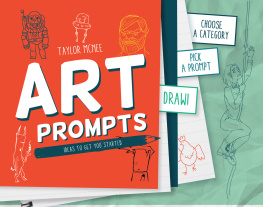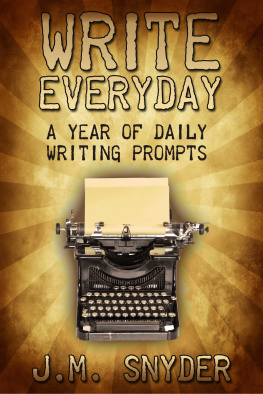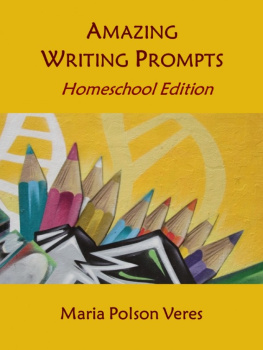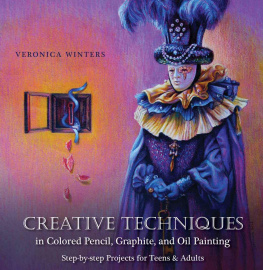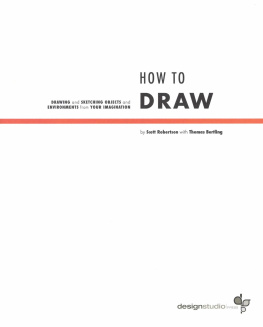TAYLOR MCNEE
ART
PROMPTS
IDEAS TO GET YOU STARTED

CONTENTS
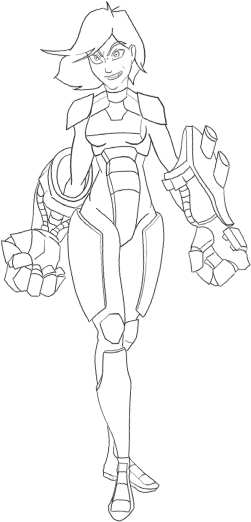
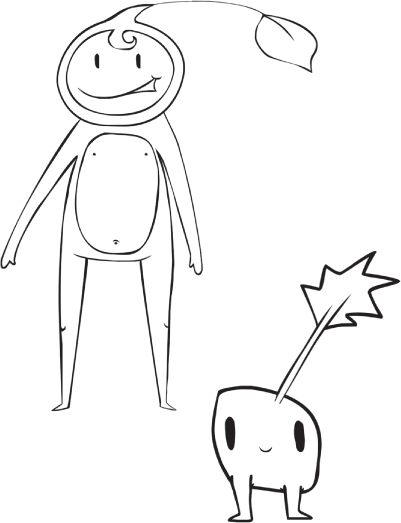
WELCOME TO ARTPROMPTS
The idea for Artprompts.org came to me out of necessity. I have always enjoyed drawing, but sometimes, I have found, it can be hard to sit down and focus when you dont have any fun ideas for subjects. Stuck for inspiration one day, I thought, Wouldnt it be cool if there was some kind of prompt generator geared specifically for artists. I looked around online, couldnt find any, so I decided to make one. My goal was to amass a huge variety of imaginative and well-written prompts for people to click through to find some inspiration for their sketchbooks, and so Artprompts.org was created. Now, this wonderful little book has followed in its footsteps.
The Artprompts book is perfect for anyone who loves to draw or who wants to improve their drawing skills. All skill levels are welcome, from those brand-new to drawing and looking for some direction, to seasoned artists struggling with artists block. Lets face it, there is always room to improve, and the best way to improve a skill set is through active practice. In these pages you will find informative articles, useful examples, inspirational prompts and draw-your-own exercises. I want to motivate you to pick up a pencil and draw. 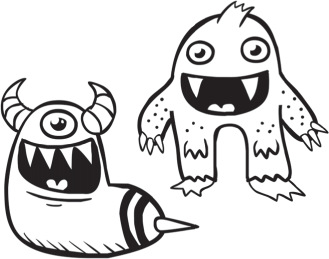
HOW TO USE THIS BOOK
Each chapter starts with one or more articles and exercises designed to help you to improve your drawing skills in five key areas: characters, creatures, objects, environments and situations.

HOW TO USE THIS BOOK
Each chapter starts with one or more articles and exercises designed to help you to improve your drawing skills in five key areas: characters, creatures, objects, environments and situations.
Read the information, then draw some prompts! Feel free to mark this book up and treat it like a sketchbook. There are lots of interactive art pages for you to complete and I encourage you to doodle in its margins as the inspiration takes you. There is no need to be stick too rigidly to the prompts; they are there to inspire you, not hold you back. For example, take the prompt: A woman with an unusually ornate braid. If the unusually ornate braid part piques your interest, but you think it would be fun to draw a man with a huge braided beard instead, do it! Feel free to interpret the prompts as you please, but do challenge yourself. Let yourself be pushed out of your comfort zone as you try new things.
The only way to get better at something is through practising it. This book is here to give lots of fun ideas to make sure that your drawing practice is never boring. 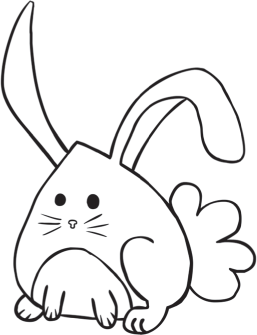
HOW TO BECOME A BETTER ARTIST
The secret to becoming an incredible illustrator isnt actually a secret at all. In fact, it is a piece of advice that seems annoyingly prevalent at times, and which can be applied to a wide range of endeavours, not just to art. It is advice that is given to those who wish to become all-star athletes, incredible musicians, fluent linguists, straight-A students, amazing artists and a seemingly endless variety of other skill sets. Are you ready for it?
Practice makes perfect.
Disappointed? You have probably heard this advice a hundred times before, but what does this somewhat vague expression mean? How does it actually work? How can this simple phrase be the solution to the grand ambitions of so many people?
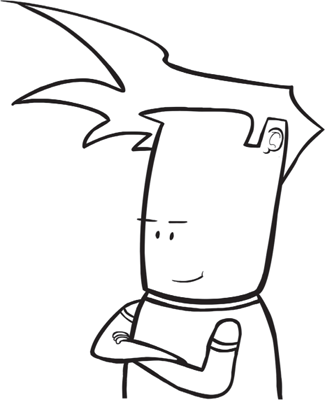
HOW OFTEN SHOULD YOU PRACTISE?
In his fascinating book
Outliers: The Story of Success, author Malcolm Gladwell puts forward the 10,000 hours rule, his concept that 10,000 hours is the amount of practice needed to become an expert at something.
Not just good but expert, as in one of the best in the world. He claims that there is no such thing as natural talent, and that the key to high levels of talent is just a matter of mindfully practising a specific skill set for an incredibly long period of time. Now 10,000 hours is a lot of time. You would have to draw for eight hours a day for over three years to achieve that target. But remember, Gladwell is talking about becoming one of the best in the world. What if you just want to be a really good artist good enough to stand out amongst your peers, to have dynamic and intriguing characters, or to be able to illustrate that graphic novel youve been writing? Let me clarify something: you dont need to practise for 10,000 hours to become a good, or even a great, artist.
You just need to start... NOW! To become stronger in an area in which you are weak, you need to deliberately and mindfully exercise your skills. Instead of fearing the unknown, why not take the time to learn? Yes, it may be confusing and frustrating, but the end result will be worth it. I recommend you make your own hours-spent goal. Why not try 100, or maybe 500 hours, to start with? Use plenty of references and resources and I guarantee you will see progress as you learn and grow. 
MAINTAINING YOUR MOTIVATION
Have you ever felt so excited to learn something new that you just couldnt wait to work on it? After picking up a new hobby or deciding to learn a new skill, you are often overflowing with inspiration and motivation, which are very powerful tools when it comes to learning.
Then after a few months, or weeks, or even days, your enthusiasm starts to wane. The new guitar sits unplayed in the corner of the room. The gym membership goes unused. The sketchbook you bought to be filled with drawings gets filed on the bookshelf and forgotten. This all-too-common scenario happens because motivation is hard to sustain, especially when your practice starts to lose its novelty or your goals get harder. You may still want to get better, but you no longer feel like setting aside time in your busy day to enable you to do so.
If you want to be a great artist, how can you push through your artists block to continue to practise and learn? The key is to acknowledge that your start-up motivation is waning, and instead of letting the project fail, you must remain disciplined. If motivation is what makes you pick up your pencil in the first place, it is discipline that will carry you through the project once the initial rush of enthusiasm fades away. Every single day, youre the result of what you did on the days prior... You can start turning yourself into who you want to be based on what you decide to do today. Chris Hadfield (NASA astronaut)
TIPS TO KEEP YOURSELF MOTIVATED THROUGH DISCIPLINE
Set your end goal Do you want to be able to draw great-looking characters with no reference? Do you want to master perspective? Illustrate a graphic novel? Knowing your goal will help you to better focus your daily practice time. Write it down Your goal is just a fleeting thought until you commit it to paper; tape it up somewhere where you will see it to act as a constant reminder.
Next page
